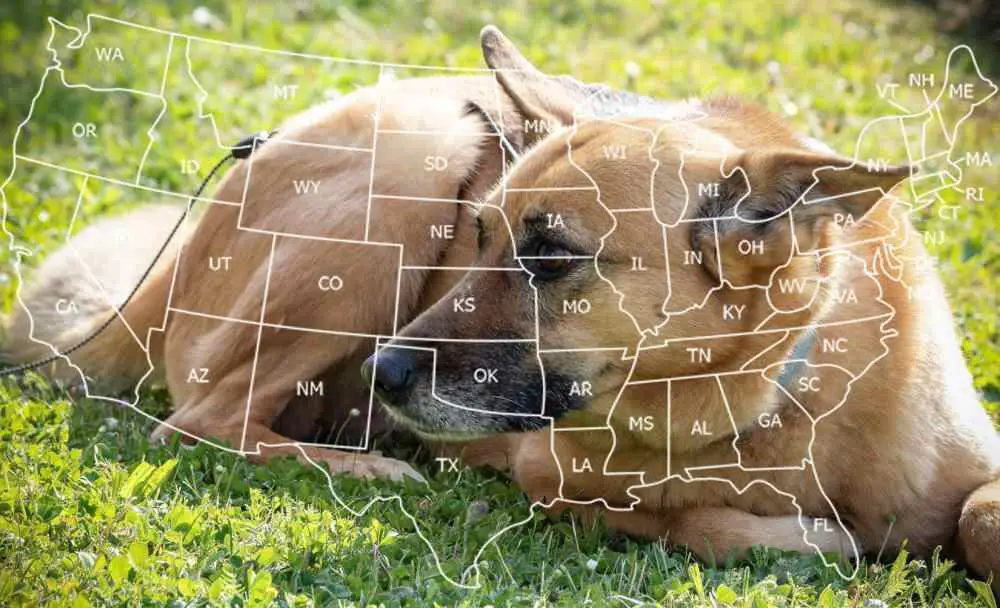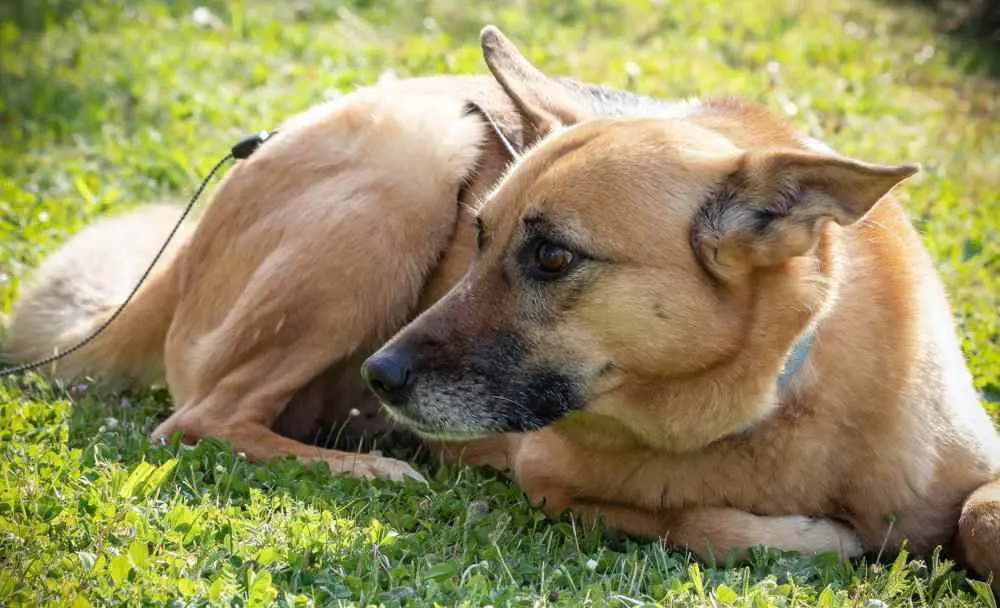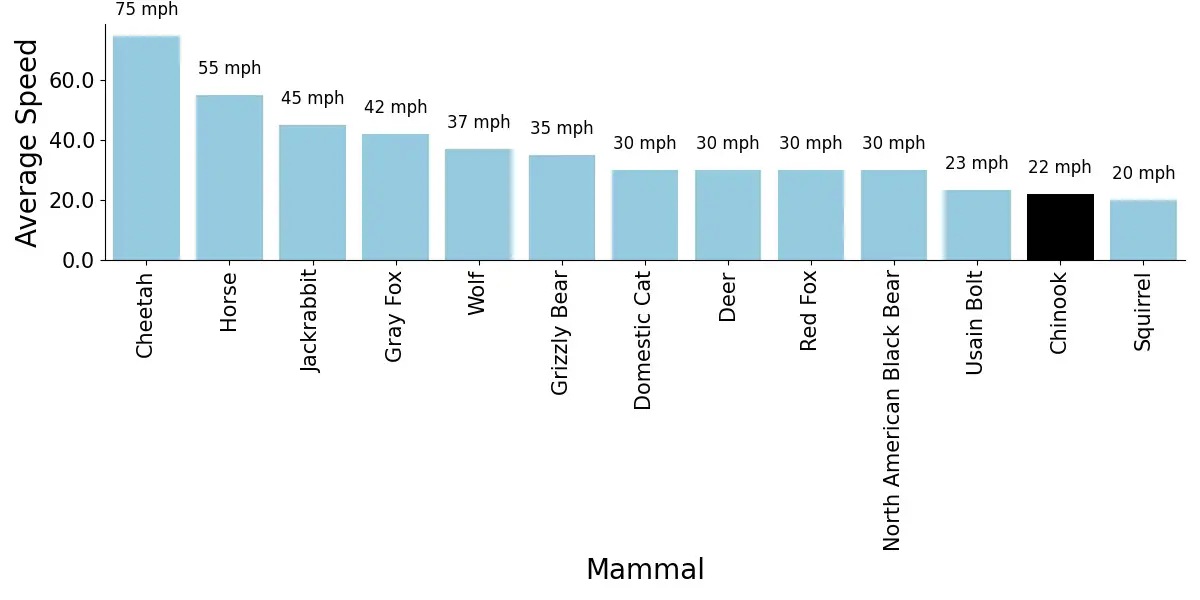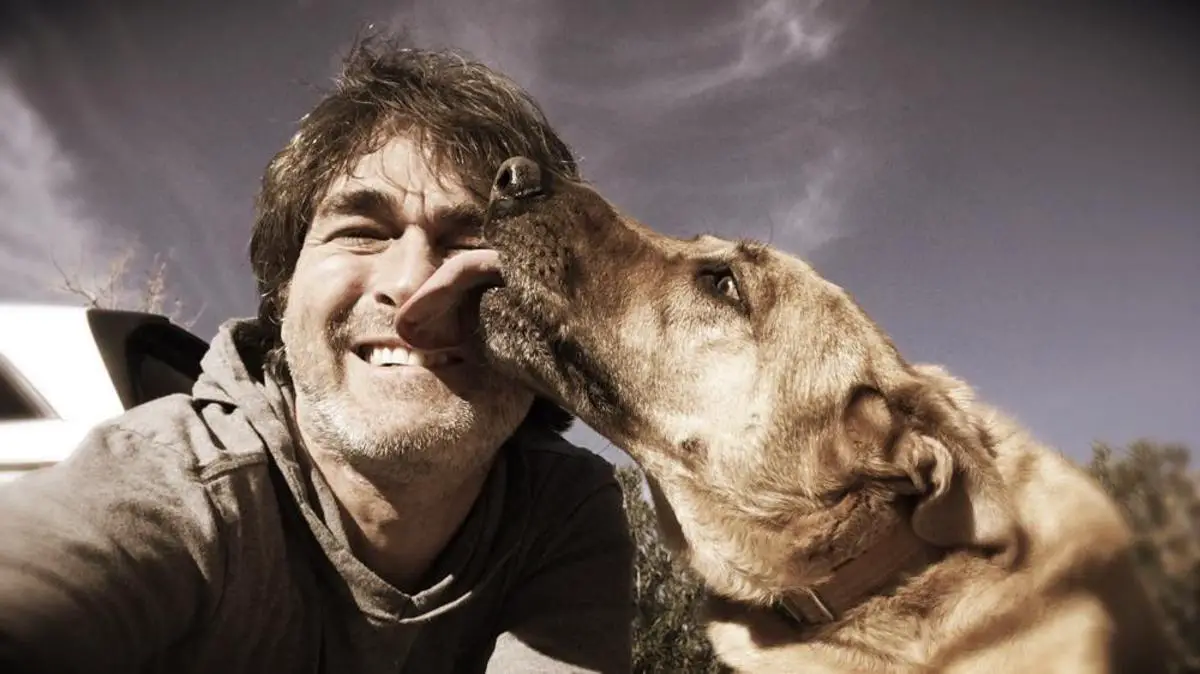Quick Links: Table of Contents
- Chinook Breed Overview
- History of the Chinook Breed. Where Chinooks came from
- What the Chinook Looks Like
- Best Chinook Breeders
- What Colors do Chinooks Have?
- The Temperament of the Chinook
- How Long Chinooks Live
- How Fast Chinooks Can Run
- How Popular are Chinooks with New Dog Owners?
- Health Problems in Chinooks and How to Prevent Them
- Dog Breeds That Are Similar to Chinooks
- Other Things to Know About Chinooks
Chinook Breed Overview
The Chinook is a large-sized dog.
The adult Chinook stands 21 to 27 inches tall at the shoulder.
The Chinook belongs to the Working Dogs group.
Dogs in the Working Dogs group, like the Chinook, were developed to assist humans in some capacity – including pulling sleds and carts, guarding flocks, guarding homes, and protecting their families.
Breeds in the Working Group are known for their imposing stature, strength, intelligence, and fearless.
Because of their size and strength, working dogs require a structured home life and firm, fair, consistent training by someone who can provide leadership without resorting to anger or physical force.
The fact that the Chinook belongs to the Working Dogs group is one of the reasons why Chinooks have the personality and temperament that they have.
The temperament of the Chinook is generally described as:
- Alert
- Calm
- Dignified
- Friendly
- Intelligent
History of the Chinook Breed. Where Chinooks came from
The first “Chinook” was born in 1917 on the farm of author and explorer Arthur Walden in New Hampshire.
The term chinook refers to warm winter winds.
Chinook was the name given to the puppy who was later identified as the breed`s father.
He was dubbed a “sport,” a natural phenomenon that bore no resemblance to either of his parents.
However, this incredible dog`s offspring did inherit his coloring, size, and other general characteristics.
The offspring were bred to have the strength of a freight dog and the speed of a racing sled dog.
In fact, the original purpose of this breed`s line was to pull a sled.
Chinooks are a rare breed because only a few breeders raise them.
.
What the Chinook Looks Like
The Chinook is a large dog with floppy ears that is usually tawny in color.
Some of these dogs, however, have erect ears; it is impossible to predict how the ears will look until the puppy is about six months old.
The coat is medium in length and has a coarse outer coat with a thick but soft undercoat.
Their tawny color ranges from light honey to a stunning reddish-gold.
They have a distinct appearance, with black markings on the inside corners of the eyes and dark tawny to black markings on the ears and muzzle.
They have almond-shaped eyes that give the appearance of intelligence.
.
Best Chinook Breeders

We have researched reputable Chinook breeders that you can buy a puppy.
Go to this page for our complete list of reputable Chinook breeders in various states in the United States.
On this page, you will see how much these breeders sell their puppies for, and how many puppies they have available.
A few of these breeders are listed below.
Intervale Chinooks
Puppy Price: Check with breeder

What Colors do Chinooks Have?
Chinooks come in the following beautiful primary colors:
Chinooks come in the following lovely secondary colors in addition to their primary colors:
The Temperament of the Chinook
The temperament of the Chinook based can be summarized as in the table below.
The table shows the scores of the Chinook for 13 important dog behavioral factors.
We obtained these scores by analyzing raw data from the C-BARQ dog personality survey tool. The higher the score of a dog for a factor, the worse the temperament of the dog regarding that factor.
The C-BARQ tool was developed by researchers from the University of Pennsylvania, and it is a scientific tool that is used worldwide for reliably measuring the temperament of dog breeds.
See our complete analysis of the temperament of the Chinook here.
| Factor | Score |
|---|---|
| Prey Drive | 42.1 percent |
| Excitability | 32.7 percent |
| Stranger Directed Fear | 29.5 percent |
| Attachment Attention Seeking | 29.4 percent |
| Energy Level | 28.0 percent |
| Separation Related Behavior | 26.9 percent |
| Dog Directed Aggression | 26.3 percent |
| Stubbornness | 23.6 percent |
| Dog Directed Fear | 22.8 percent |
| Stranger Directed Aggression | 16.0 percent |
| Touch Sensitivity | 15.8 percent |
| Nonsocial Fear | 12.9 percent |
| Owner Directed Aggression | 0.0 percent |
| Dog Rivalry | 0.0 percent |
How Long Chinooks Live
The lifespan of the Chinook is typically from 12 to 15 years.
Chinooks live long if they eat well, drink well, exercise well, and visit the veterinarian regularly.
How Fast Chinooks Can Run

How fast a dog breed can run is a good measure of how athletic the dog breed is.
The American Kennel Club (AKC) regularly conducts dog running competitions. The AKC records the running speed of competing dogs in these competitions. These competitions are open to all dog breeds.
Based on our analysis of the speeds of 11 different Chinooks, the average speed of the Chinook is 22.1 mph (35.6 kmph).
The fastest speed on AKC record that the Chinook ran in a race is 25.09 mph (40.4 kmph) and the minimum speed on record in a race for a Chinook is 15.85 mph (25.5 kmph).
Click here to see how the speed of the Chinook compares to the speed of other dogs and other mammals such as cats, horses, humans, etc.

How Popular are Chinooks with New Dog Owners?
Every year, the American Kennel Club (AKC) publishes information on how popular a dog breed is in that particular year. The AKC gets the popularity information of a breed from how many dogs of that breed the owners register with the AKC every year. The AKC collects this data for about 200 dog breeds.
The graph below shows the popularity trend of the Chinook.
The popularity of the Chinook averaged over the years is Number 176 out of about 200 dog breeds.
Do not get a dog breed just because it is a popular dog breed. And do not reject a dog breed just because it is an unpopular breed.
Health Problems in Chinooks and How to Prevent Them
Every dog breed has its own set of health problems that it tends to develop. There is nothing like a perfect dog breed.
The Chinook is prone to certain genetic health conditions. The Orthopedic Foundation for Animals (OFA) is an organization that keeps track of genetic health problems in dog breeds.
From the extensive records that the OFA keeps, the OFA knows what health problems each dog breed is naturally prone to develop.
Hence, the OFA recommends which health screening breeders should perform on a dog breed to make sure that the breeders won`t breed `defective` dog parents that can pass down defective genes to their puppy offspring.
If you want a Chinook puppy that will grow up to be healthy, make sure that your Chinook breeder screens your puppy or your puppy`s parents for the health problems that the OFA recommends for your puppy`s breed. This will increase the chances that your puppy is free from genetic defects.
The following are the health tests that Orthopedic Foundation for Animals (OFA) recommends that breeders should screen Chinooks for:
You can find out more about OFA`s recommended tests for Chinooks here.
Dog Breeds That Are Similar to Chinooks
If you have not made up your mind on which dog breed to get, you may also want to consider some other dogs similar to the Chinook.
We crunched the numbers and found that the following dog breeds that have similar behavior and temperament as the Chinook:
- Collie (74 percent match with Chinook). Learn more about the Collie here.
- Keeshond (76 percent match with Chinook). Learn more about the Keeshond here.
- King Shepherd (75 percent match with Chinook). Learn more about the King Shepherd here.
Other Things to Know About Chinooks
Here are some of the very important characteristics of the Chinook that you need to know about the Chinook breed:
